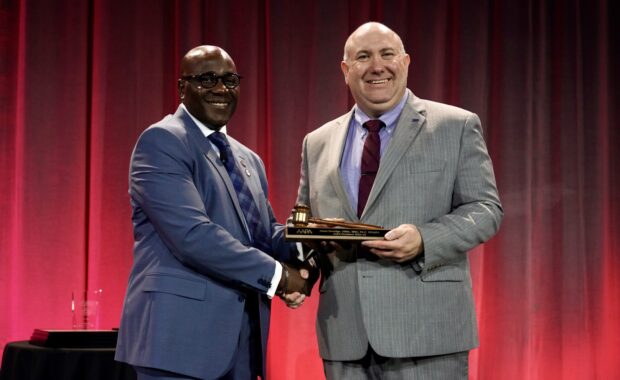COVID-19 Reinforces Urgent Need for the PA Direct Payment Act
AAPA Staff and Members Working to Advance Legislation in Congress
September 18, 2020
A top legislative priority for AAPA throughout the 116th Congress, which began in January 2019 and runs through the end of this year, has been advocating for Congress to pass legislation authorizing PAs to receive direct payment under Medicare. PAs are the only health professionals who are assigned National Provider Identifier (NPI) numbers and whose services are covered by Medicare but who are not yet able to be directly paid for providing those services through the Medicare program.
Under current law only the employer of a PA can receive payment for services performed by a PA. This restriction makes it more burdensome for organizations such as hospitals to utilize PAs as contractors versus employees. All other health professionals authorized to provide services under the Medicare program—physicians, advanced practice registered nurses (APRNs), physical therapists, psychologists, podiatrists, social workers, and others—are permitted to receive direct payment under their own name and NPI.
[Stay up to date on legislative information that impacts you – join or renew today]
Legislation would update Medicare laws
AAPA staff and dedicated PA advocates have been working with determination to advance the PA Direct Payment Act (S.596/H.R. 1052) during this Congress. This important legislation would update Medicare laws to ensure PAs can permanently receive direct payment for their services. We have been fortunate to have dedicated champions introducing and sponsoring this legislation which has gained strong bipartisan and bicameral support in Congress. The primary sponsors of the PA Direct Payment Act are Senators John Barasso (R-WY, an orthopedic surgeon and a senior member of Senate Republican leadership) and Tom Carper (D-DE, a senior member of the Senate Finance Committee), who introduced the bill in the Senate, and Representatives Terri Sewell (D-AL) and Adrian Smith (R-NE), who are both leaders in the House Ways and Means Committee.
During the spring and summer of 2020, COVID-19 caused the healthcare sector and Congress both to shift focus to addressing the pandemic. During this time, AAPA also shifted its advocacy efforts, working to shape COVID-19 legislation to address the needs of PAs working on the front lines. AAPA successfully advocated for increasing access to personal protective equipment (PPE) for healthcare providers, increasing coverage for telehealth services, and permanently authorizing PAs to order and manage home health services for Medicare patients. AAPA has also asked Congress to include the PA Direct Pay Act in COVID-19 related legislation.
COVID-19 highlights difficulties from outdated policy
The COVID-19 pandemic has reinforced the urgent need for the PA Direct Payment Act to become law, by bringing to light many of the difficulties faced by PAs as a result of this outdated policy. This is especially the case in rural areas, where Medicare allows PA-owned rural health clinics (RHCs) to receive Medicare payments in some instances. These PA-owned RHCs are only permitted to receive Medicare payment for bundled RHC primary care services. PA-owned RHCs are required to bear the costs of services not included in the bundled payment. For instance, COVID-19 and flu testing, as well as other laboratory services, are not included in the payment bundle for RHC primary care services.
A growing number of patients receive the majority of their medical care directly from PAs, especially those patients living in rural or underserved areas. This outdated, unnecessary and pointless restriction on PA payment can disrupt continuity of care for patients who rely on PAs for their healthcare, with a pronounced impact on seniors and those with disabilities who need increased access to high-quality care during the COVID-19 response.
The PA Direct Payment Act would fix this inequity, remove a barrier to PA practice that is not based on ability or scope of practice, and allow PAs to be treated like every other Medicare provider when it comes to reimbursement for services.
Need to keep direct pay at forefront
AAPA has worked closely with the relevant Congressional committees and leadership to build support for the PA Direct Payment Act over the last several years and has continued these efforts during the COVID-19 pandemic. While this legislation has not been included in any of the legislative packages responding to COVID-19, AAPA certainly appreciates the efforts by our Congressional champions to keep this issue at the forefront.
[Support AAPA’s policy and efforts – join or renew your membership today]
AAPA will continue to strongly advocate for inclusion of the PA Direct Payment Act in any additional emergency legislation moving forward, and for PAs to be included in all relevant provisions included or created by such legislation.
AAPA thanks the thousands of tireless PA advocates who for years have made the case to members of Congress about the necessity to eliminate the unwarranted restrictions on PA practice. These advocates have called, written, and visited their Members of Congress, most recently as part of the 2020 Leadership and Advocacy Summit, to make their Congressional representatives aware of their support for this legislation.
We continue to urge PAs to use the AAPA Advocacy Action Center to contact their members in the U.S. House and U.S. Senate and ask them to cosponsor the PA Direct Payment Act.
For questions on the PA Direct Payment Act, or advocacy in general, please contact Tate Heuer, VP for Federal Advocacy at [email protected].
You May Also Like
How to Advocate in a Time of Social Distancing
Quantifying PA Productivity Can be Challenging
New CMS Rule Provides Additional PA Practice Flexibility



